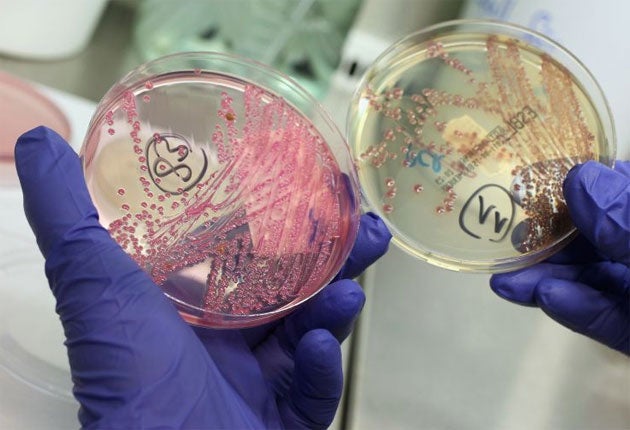E.coli linked to bacteria in soil

Your support helps us to tell the story
From reproductive rights to climate change to Big Tech, The Independent is on the ground when the story is developing. Whether it's investigating the financials of Elon Musk's pro-Trump PAC or producing our latest documentary, 'The A Word', which shines a light on the American women fighting for reproductive rights, we know how important it is to parse out the facts from the messaging.
At such a critical moment in US history, we need reporters on the ground. Your donation allows us to keep sending journalists to speak to both sides of the story.
The Independent is trusted by Americans across the entire political spectrum. And unlike many other quality news outlets, we choose not to lock Americans out of our reporting and analysis with paywalls. We believe quality journalism should be available to everyone, paid for by those who can afford it.
Your support makes all the difference.People are being warned to wash fruit and vegetables thoroughly after experts linked an E.coli outbreak to bacteria contained in soil.
Some 250 people became ill with gastrointestinal disease, including vomiting and diarrhoea, between December last year and this July.
They had a subtype of E.coli O157 known as Phage Type 8 (PT8) and cases occurred across England, Scotland and Wales.
Some 74 people ended up in hospital, with four suffering from a complication called Haemolytic Uraemic Syndrome (HUS). One patient, who had underlying health problems, died.
Today, the Health Protection Agency (HPA) said people should ensure they wash fruit, vegetables and salads thoroughly, and keep their kitchens clean to prevent another potential outbreak.
An HPA investigation found a link between the illness and handling loose leeks and potatoes in the home.
The cases involved potatoes and leeks bought in or bought from sacks, rather than those that were pre-packaged.
There was no evidence that one particular retailer or variety of the vegetable was to blame.
Researchers found that people who were unwell were 40 times more likely to have been in a household where people handled leeks sold loose, and 12 times more likely to have been in a household where people handled potatoes bought in or sold from sacks.
However, while handling raw vegetables offered an explanation for most cases, it did not explain them all.
Dr Bob Adak, a gastrointestinal disease expert at the HPA and head of the outbreak control team, said: "Our study showed a statistically significant association with raw loose leeks and potatoes from sacks but these vegetables may not be the only source of contamination.
"We also want to stress that it is safe to eat these vegetables as long as they have been stored correctly, thoroughly washed before cooking and good kitchen hygiene practices are followed.
"In this outbreak, which is now over, the vegetables could have carried traces of contaminated soil.
"It is possible people caught the infection from cross contamination in storage, inadequate washing of loose vegetables, insufficient hand washing after handling the vegetables or by failing to thoroughly clean kitchen equipment, utensils or surfaces after preparing the vegetables."
Dr Andrew Wadge, chief scientist at the Food Standards Agency, said: "It's sadly a myth that a little bit of dirt doesn't do you any harm; soil can sometimes carry harmful bacteria and, although food producers have good systems in place to clean vegetables, the risk can never be entirely eliminated.
"Control of infection from E.coli O157 relies on an awareness of all potential sources of the bacteria and high standards of hygiene where it may be present.
"This outbreak is a timely reminder that it is essential to wash all fruits and vegetables, including salad, before you eat them, unless they are labelled 'ready to eat', to ensure that they are clean.
"It is also important to wash hands thoroughly as well as clean chopping boards, knives and other utensils after preparing vegetables to prevent cross contamination."
Dr Adak, from HPA, said the risk of E.coli was very small compared to the "huge benefit" of eating plenty of vegetables.
"But E.coli O157 is a serious infection that can cause significant harm, and the public can protect themselves by taking simple but essential precautions such as preparing raw vegetables safely."
PA
Join our commenting forum
Join thought-provoking conversations, follow other Independent readers and see their replies
Comments